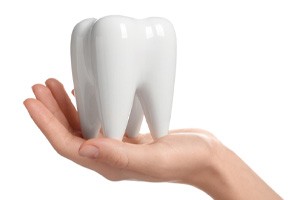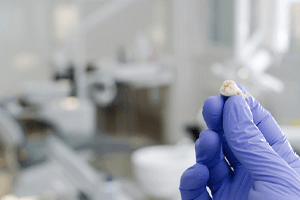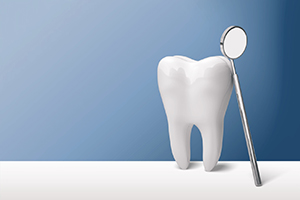
Tooth Extractions – Northborough, MA
Gentle Tooth Removal to Support Long-Term Oral Health

We always strive to help our patients retain their natural teeth for a lifetime. In some instances, however, it is necessary to remove one or more teeth for the sake of an individual’s long-term oral health. If that becomes true in your case, we will perform your tooth extractions in Northborough as gently and comfortably as possible. Later on, we may be able to replace the lost tooth with a dental implant or other type of prosthetic.
Why Choose Northborough Dental Associates for Tooth Extractions?
- Patient comfort is a high priority
- Recommended only as a last resort
- State-of-the-art tooth replacement available
Reasons Why Tooth Extractions Are Necessary

Your dentist in Northborough may recommend that you undergo a tooth extraction if:
- You have a badly damaged or infected tooth that cannot be preserved via more conservative treatments.
- You have an impacted tooth (one stuck beneath the gumline) that is threatening your oral health.
- It is necessary to remove one or more teeth to make room for orthodontic treatment or dentures.
- You have primary (baby) teeth that have not fallen out in a timely manner.
- You have supernumerary (extra) teeth that are interfering with your bite or posing other problems for your oral health.
The Process of Removing a Tooth

For a non-surgical extraction, also called a simple extraction, we numb the area around the tooth to ensure that the patient is comfortable. During the extraction procedure itself, we use an elevator to slightly lift the tooth. Then, we grip it with forceps and rock it back and forth in order to sever the ligaments that connect it to the bone. After the tooth is out, we use gauze to control any bleeding.
Surgical extractions are more complex. They might require that incisions be made in the gums or that a tooth gets broken into pieces. We sometimes refer patients to specialists for this type of procedure.
Following an extraction, we may strongly urge you to consider your tooth replacement options so you can prevent future tooth loss and other problems.
Tooth Extraction Aftercare

Here are a few important notes about tooth extraction aftercare:
- Over-the-counter pain relievers should be enough to soothe any post-procedure discomfort.
- Most patients are able to resume their normal routine after just a few days of recovery time. In the meantime, you should get plenty of rest.
- Rinsing with salt water can help to relieve inflammation.
- You should not smoke or drink out of a straw (doing either of these things might cause dry socket, a painful complication).
- Keeping your head propped up on pillows while you rest can minimize bleeding.
- You may be eligible for tooth replacement within weeks of your extraction. Be sure to attend all follow-up appointments as recommended by your dental team.
Understanding the Cost of Tooth Extractions

The cost of tooth extractions varies from case to case. When you visit us for your emergency or restorative consultation, we will be able to provide you with a price estimate. We will also assist you as you learn about your payment options, such as financing and dental insurance. For most patients, tooth extractions prove to be an affordable and necessary way to improve their oral health.
Factors That Can Affect Tooth Extraction Cost

Some factors that can have a bearing on the cost of tooth extractions include:
- The type of tooth that is being extracted. Depending on their structure and location in the mouth, some teeth are more difficult to remove than others. Therefore, they incur higher fees.
- The number of teeth that must be extracted. Logically, removing more teeth costs more than removing just one.
- The overall complexity of the case. Some teeth are impacted (stuck beneath the gumline), meaning that extracting them is more difficult. Additionally, while we can handle most extractions in-house, we occasionally must refer patients to an outside specialist. Specialists may have a pricing structure that is quite different from our own.
- Additional care. After your extraction, you will likely need to get your missing tooth replaced with a dental implant, bridge, or denture. Each of these restorations comes with its own unique cost, as well as its own pros and cons.
Does Dental Insurance Cover Tooth Extractions?

Most of the time, yes, dental insurance covers tooth extractions. Simple extractions are usually classed as a minor service, meaning that approximately 80% of their price tends to be covered. Surgical extractions, on the other hand, may be just 50% covered, up to the amount of your policy’s annual maximum.
Our team is used to dealing with the details of dental insurance. You can rely on us to help you navigate your benefits and use them to your greatest advantage.
Other Options for Making Tooth Extractions Affordable

Here are a couple of additional provisions that may make it easier to afford your tooth extractions:
- We accept payment from CareCredit, a third-party financier that offers low-interest and no-interest payment plans to eligible patients. Most people qualify for credit after a fast and easy application process.
- Essential Dental Plan. This discount plan is designed for patients without insurance. It can provide you with reduced rates on virtually all of the services available in our Northborough dental practice.
Do not let concerns about money prevent you from receiving necessary treatments. If you are ready to learn more about tooth extractions and their cost, our team is eager to answer your questions. Get in touch with us today to schedule your personalized consultation.
Tooth Extractions FAQs

We understand that the prospect of undergoing a tooth extraction can be a little nerve-wracking. We want to make your treatment experience as easy as possible, so to help you understand the road ahead, we have put together the following list of FAQs about extractions. If you do not find the information you are most curious about, reach out to us directly so we can personally assist you.
Does Getting a Tooth Extracted Hurt?
The first step in the extraction process is to numb the mouth. Local anesthesia prevents you from feeling pain, so you can expect to be reasonably comfortable during your procedure. However, you might feel some pressure as we work to remove your tooth.
Once the local anesthesia wears off, you are like to experience some soreness and discomfort. We will provide aftercare instructions to make your recovery process as easy as possible. If you notice any severe pain or signs of infection while you are healing, get in touch with us right away.
What Are My Options for Replacing a Missing Tooth?
A dentist can replace a missing tooth in a few different ways:
- Dental implant. A dental implant is a prosthetic tooth root. We insert it into the jawbone, where it can later support a crown. This is widely regarded as the best way to replace a missing tooth.
- A fixed bridge has two crowns, which support a pontic (artificial tooth) between them. The crowns get attached to the teeth on either side of the gap in a patient’s mouth.
- If you are missing multiple teeth, you may be eligible for either a full or partial denture. These removable prosthetics are convenient and cost-effective.
Your dentist will help you weigh the pros and cons of each of your tooth replacement options.
Can I Leave the Space Empty After a Tooth Extraction?
In the vast majority of cases, it is the course of wisdom to replace a missing tooth as soon as possible. This is true even if the empty space is not visible when you smile. Even a single missing tooth can lead to oral health complications. For example, the adjacent teeth may begin to drift out of place, leading to a misaligned bite. The jawbone could also start to deteriorate. Eventually, you could suffer further tooth loss.
How Should I Prepare for My Tooth Extraction?
Here are a few practical steps that you can take before your extraction:
- Talk to your dentist. Feel free to ask any questions you may have about the procedure.
- Stock up on soft foods. You may need to adhere to a no-chew or fork-tender diet for a few days after your procedure.
- Arrange for a ride. Having a trusted adult drive you to and from your appointment can make your experience as easy, safe, and stress-free as possible.